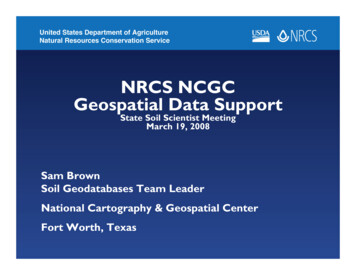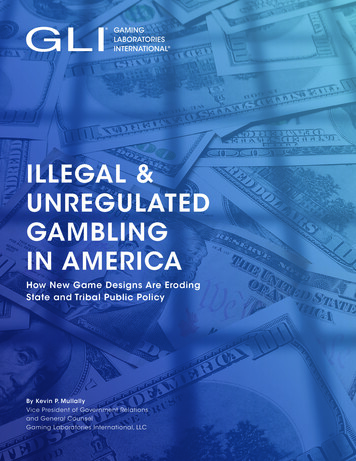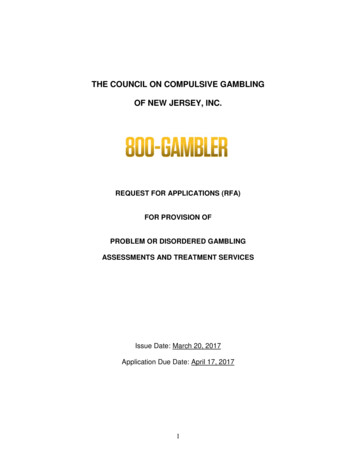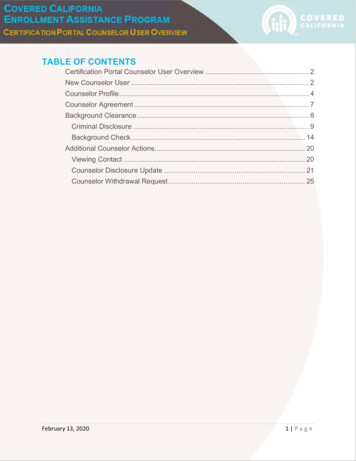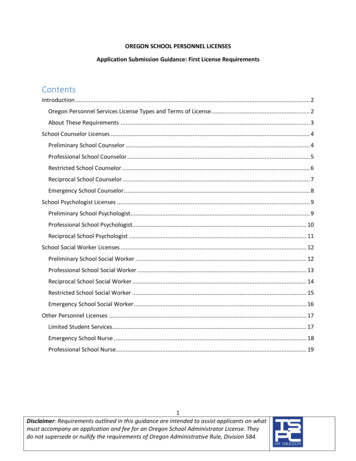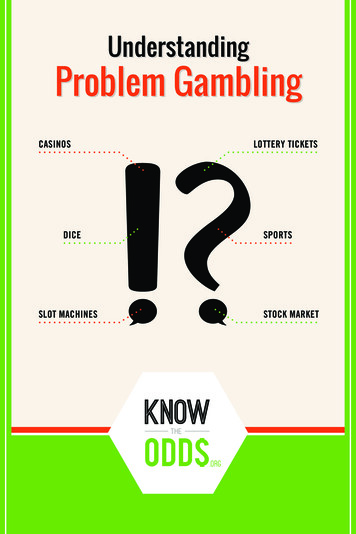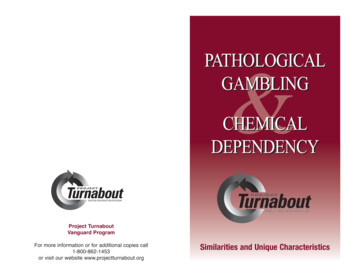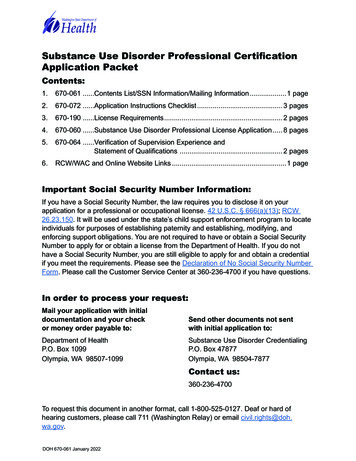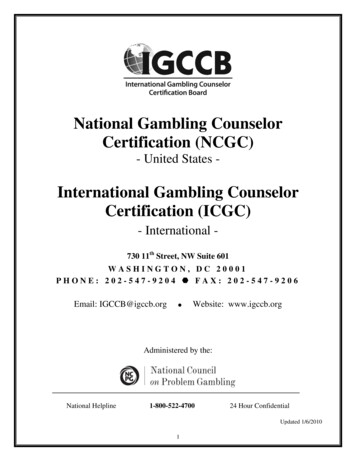
Transcription
National Gambling CounselorCertification (NCGC)- United States -International Gambling CounselorCertification (ICGC)- International 730 11th Street, NW Suite 601WASHINGTON, DC 20001PHONE: 202-547-9204 FAX: 202-547-9206Email: IGCCB@igccb.org Website: www.igccb.orgAdministered by the:National Helpline1-800-522-470024 Hour ConfidentialUpdated 1/6/20101
THE NATIONAL STANDARDThe national standard will be used by the International Gambling Counselor Certification Board (IGCCB) to judgethe competencies of any applicant who applies for national certification. If an applicant's competencies meet thestandard, the board will grant the designation: National Certified Gambling Counselor-I (NCGC-I) or NationalCertified Gambling Counselor-II (NCGC-II) in the United States or International Certified Gambling Counselor-I(ICGC-I) or International Certified Gambling Counselor-II (ICGC-II) outside of the United States. Recognition ofthe certification is voluntary. The design of this certification system is one of quality control and assurance ofclinical competency. Once achieved, this self-imposed monitoring system will make available a known and acceptedlevel of performance by the certified counselor and consequently will encourage performance by the certifiedcounselor and consequently will encourage recognition from other agencies.THE STANDARDThe certification program for gambling counselors is based upon key elements of the counseling profession. Thestandard will be used to evaluate each applicant's qualifications. Individuals with the basic competencies to assumeresponsibility for counseling pathological gamblers, their families, and associates, regardless of program setting, willbe eligible for certification. Gambling counseling is a service which should be rendered by those with adequatetraining and expertise. Such expertise will be determined through the certification process. Appropriate services willbe rendered to persons with pathological or related gambling problems and to others affected by the disorder.Certification provides all practitioners with a marketable credential of comparable value but different from othercredentials such as degrees, etc. It is most valuable in settings where experience is highly valued since it is basedupon a standard used to judge competencies gained in a work setting in addition to training. It is not certification fora particular position, or a license to practice, although it may be accepted as an essential, preferred, or alternativecredential by employers, state and local officials or accreditation bodies.ORGANIZATIONAL GOALS OF CERTIFICATIONIn order to assure a body of qualified and competent professionals working in the field of clinical treatment withpathological and problem gamblers and their families, the International Gambling Counselor Certification Board isproposing the following organizational goals to aid in the certification of gambling counselors nationally: To assure that Gambling Counselors nationally possess high standards of training, competence, skills andknowledge. To develop and operate a system of evaluation, screening, certification and a national registry for gamblingcounselors nationally and internationally. To assure that this certification and registry process is available to all interested applicants. To establish and endorse a professional code of ethics. To maintain coordination and liaison with state officials, professional associations and educationalinstitutions to keep current developments in the field of gambling treatment, and to periodically review,modify, update and improve current standards of competence, skills and knowledge. To establish a central registry of certified gambling counselors and maintain all necessary records ofapplicants.Certification and registry of gambling counselors internationally is a voluntary process conceived by professionalsin both the treatment field and the professional community to endorse an independent body to conduct thecertification and registration process.The International Gambling Counselor Certification Board has members selected to represent various areas of thecountry as well as various professional disciplines.1
CRITERIA FOR CERTIFICATIONThe following is an outline of the requirements for certification as a National Certified Gambling counselor. Moredetailed information follows.1.Bachelors degree or equivalent in the behavioral health field such as license or certification in a recognizedbehavioral health field (i.e. psychology, addictions, clinical social work)2.30 hours (NCGC-I) or 60 hours (NCGC-II) of gambling specific training and education3.100* hours (NCGC-I) or 2,000* hours (NCGC-II) clinical experience treating gamblers and/or familymembers in an approved setting with a minimum number of sessions with a International GamblingCounselor Board Approved Clinical Consultant (BACC)4.Signed statements from two co-workers5.Signed statement from on-site clinical supervisor6.Signed statement from Board Approved Clinical Consultant. (BACC)7.Signed application form, ethical statement form and directory authorization form8.Passing score on Certification Examination for Gambling Counselors (www.ptcny.com/clients/IGCCB/)9.Check, money order, or credit card payment in the amount of 185* Please see NCGC-I/NCGC-II Criteria for “Clinical Experience” belowEDUCATION and TRAINING:A minimum of 30 hours of approved gambling specific training or education must be completed with appropriatesupporting documentation as defined by the IGCCB. As of April 3, 2007 the International Gambling CounselorCertification Board requires a Bachelors Degree or equivalent in behavioral health field (e.g. license or certificate inpsychology, sociology, chemical dependency, counseling, social work, etc.) to meet the behavioral educationrequirement for certification. This will end and replace the previous requirement of 300 hours of education from abehavioral health field. All applications for national gambling counselor certification received after midnight ofApril 3, 2007, are subject to the new Bachelors Degree or equivalent requirements.CLINICAL EXPERIENCE:Minimum of 100 hours as a gambling counselor delivering direct treatment to problem/pathological gamblers andsignificant others, in a Board approved setting with a IGCCB approved clinical consultant (BACC). This can befulfilled by 50% or 50 hours volunteer work experience, the balance being paid experience. The Board reserves theright to assign and review a 100 hour field work practicum to applicants who are not working under a IGCCBapproved clinical consultant or an individual qualified (in experience and training) to supervise gambling counselingactivities. See section A below for details.1.NCGC-I Criteria for “Clinical Experience”Minimum guidelines for approved supervision/consultation should include at least 4 one hour sessions. IGCCBclinical consultation maybe done in person, by phone, by email, or as arranged between supervisor andapplicant. Applicant may present properly documented past clinical work with gamblers and their familymembers for consideration by the IGCCB approved clinical consultant, and if accepted by the BACC (Boardapproved clinical consultant) and the IGCCB, these hours may be credited toward the 100 experiential hoursrequired for NCGC-I. These should include a minimum caseload as agreed to with the BACC. (ClinicalConsultant guidelines will include reporting forms, case presentation guidelines, and suggested minimumcaseloads).2
National Certified Gambling Counselor –IIEDUCATION and TRAINING:A minimum of 60 hours of approved gambling specific training or education must be completed with appropriatesupporting documentation as defined by the IGCCB. As of April 3, 2007 the International Gambling CounselorCertification Board requires a Bachelors Degree or equivalent in behavioral health field (e.g. license or certificate inpsychology, sociology, chemical dependency, counseling, social work, etc.) to meet the behavioral educationrequirement for certification. This will end and replace the previous requirement of 300 hours of education from abehavioral health field. All applications for national gambling counselor certification received after midnight ofApril 3, 2007, are subject to the new Bachelors Degree or equivalent requirements.CLINICAL EXPERIENCE:Minimum of 2,000 hours (or one year full time equivalent) as a gambling counselor delivering direct treatment toproblem/pathological gamblers and significant others, in a Board approved setting with a IGCCB approved clinicalconsultant. This can be fulfilled by 50% or 1,000 hours volunteer work experience, the balance being paidexperience. The Board reserves the right to assign and review a 2,000 hour field work practicum to applicants whoare not working under a Board approved clinical consultant or an individual qualified (in experience and training) tosupervise gambling counseling activities. See section B below for details.2.NCGC-II Criteria for “Clinical Experience”Minimum guidelines for approved supervision should include at least two one hour sessions per month for aminimum of 12 months (24 hrs.). IGCCB clinical consultation maybe done in person, by phone, by email, or asarranged between supervisor and applicant. Applicant may present properly documented past clinical work withgamblers and their family members for consideration by the IGCCB approved clinical consultant, and ifaccepted by the BACC (Board approved clinical consultant) and the IGCCB, these hours may be creditedtoward the 2,000 experiential hours required for NCGC-II. These should include a minimum caseload as agreedto with the BACC. (Clinical Consultant guidelines will include reporting forms, case presentation guidelines,and suggested minimum caseloads).DEFINITIONSDirect treatment to problem/pathological gamblers and significant others is defined as:1. Face to face clock hours with gambling clients2. Face to face clock hours with gamblers and/or their families.3. All hours of documentation for gambling clients or family member to:Patients chartE.A.P./employerCounselor supervisorReferral agents/other mental health workers court/parole/probation officers4. Any lengthy telephone interventions (30 min. or more, documented).5. Assessments of clients for a gambling problem.6. Preparation of discharge summaries, evaluations and/or aftercare plans for other agencies or care providers.7. Review of gambling cases to medical or clinical director.8. Case management services to managed care providers or utilization review for gambling cases.9. Lectures/educational sessions for gamblers or their family members, in treatment on areas of addiction, ormental health and recovery. A maximum of 10 hours of educational sessions can be given. All must be newand non-repetitive.10. Treatment planning sessions with the treatment team.3
ALL APPLICANTS1. Applicants must have completed a supervised counseling internship at an approved site. College creditinternships can be used either as educational contact hours or supervised experience but not both.2. All applicants will be expected to abide by the Certified Gambling Counselors code of ethics.3. Counselors must be re-certified every three years through evidence of 60 hours of approved non-repetitivecontinuing education, 30 of these hours must be gambling specific approved hours. 15 of the above hoursshould be from national or regional conferences where recent research and treatment approaches arediscussed. The remaining 30 hours (nonspecific) can be obtained through a variety of methods including:college courses, conferences, seminars, training programs, etc. in the behavioral health field. All of thecontinuing education and training requirements must be new and non-repetitive, and must also be relatedto counselor competency areas as listed in the appropriate section.4. Applicants must have proof of a bachelor’s degree in behavioral health field or equivalency (e.g. license orcertificate in psychology, sociology, chemical dependency, counseling, social work, etc.) as well as theirhours of experience as a gambling counselor.5. Certification may be suspended or revoked upon the recommendation of the Board for violation of the codeof ethics. (This code is meant to complement those existing codes for M. D's, Ph.D.'s, L.C.S.W.'s, andC.A.C.'s, not replace or compete.)6. Applicants who have been denied certification by the Board may apply for re-examination withoutprejudice. The decision of the Board in all matters is final and irrevocable.BOARD APPROVED CLINICAL CONSULTANTS (BACC) CRITERIAThe International Gambling Counselor Certification Board lists the following requirements for Board ApprovedClinical Consultants or BACC’s:1.Graduate Degree or equivalent, subject to IGCCB approval.2.NCGC Certification: Is currently certified and maintains certification as a NCGC-II (Nationally CertifiedGambling Counselor, level II) for an approved length of time.3.Knowledge and Experience of Clinical Supervision: Demonstrated experience of at least three years as aclinical supervisor in a clinical setting with completion of a course, class, in-service education, or seminaron “how to do clinical supervision” of at least 6 hours in duration.4.Experience in Gambling Treatment: Have a minimum of 2,000 documented clinical hours (in addition tothe original NCGC-II requirements) in providing gambling treatment as consideration of applicant’s overallexperience. In support of these hours, a description is needed of work with gamblers and their familiesindicating depth of experience and substance of clinical work with clients, such that expertise in clinicalcare and supervision is demonstrated and the applicant is ready to offer the benefits of this experience andknowledge to counselors new to the gambling treatment field.5.Demonstrated Expertise: Have demonstrated expertise in the area of pathological gambling. Such evidenceshould include, but need not be limited to: employment in a gambling treatment program/individualpractice along with; published papers, original clinical research, or articles on gambling specific clinicalsubject matter, presented at state, national or international conference on the treatment of pathologicalgamblers and their families. Such evidence must be submitted to and be approved by the Board.6.Recommendations: Obtain at least two letters of recommendation. One of these letters must be from anIGCCB Board Approved Clinical Consultant or BACC.4
COMPETENCY REQUIREMENTSCommunicationThe gambling counselor shall be able to communicate in a variety of situations to assure that the needs ofpathological or problem gamblers, their families and/or significant others are met and that continuity of care ismaintained through case collaboration with other health care providers. Applicants will be able to demonstrate thefollowing: Speak, read and write with proficiency, to establish communication readily, and to maintain records andwritten reports. Knowledge of gambling, problem gambling and pathological gambling: treatment andrehabilitation/recovery, understanding the history, prevalence and social impact of gambling in the UnitedStates, as well as the significant literature in the field. Understanding the history and theoretical basis for treatment of pathological/problem gamblers, as well asfamiliarity with current research in the field. The effect of problem/pathological gambling on the gambler personally, interpersonally, financially, aswell as management of the disorder, and the recovery process. Understanding other addictions and an ability to demonstrate a thorough knowledge of addiction, treatment,relapse and the recovery process. Knowledge of sociocultural values and attitude systems related to: finances; pathological/problemgambling and spiritual concerns. Knowledge of effective medical, psychological social service and spiritual management ofpathological/problem gamblers, as well as the recovery process. Knowledge of sociocultural values and effective medical, psychological, social service and spiritualmanagement of the family of the pathological/problem gambler. Knowledge of the effect of pathological/problem gambling on occupational and legal concerns.Assessment and EvaluationTo insure appropriate services to meet the needs of clients, the ability to evaluate and assess the needs and problemstage of the client in therapy is a requirement. Knowledge of human growth and development. Knowledge of family dynamics and interaction. Knowledge of pathological and problem gambling Knowledge of stages of change theory with problem and pathological gamblers and families Knowledge of motivational enhancement Knowledge of the signs and symptoms of alcohol use, abuse and addiction. Analytical skills Case history methodology Ability to recognize appropriate treatment modalities Evaluation of client's progress Goal setting, contracting and problem solvingTreatment PlanningThe gambling counselor shall be able to actively involve clients in the development of the individualized treatmentplan. Share information and evaluation results with client and interpret material to those involved. Inform clients of their legal rights regarding acceptance of and participation in a treatment or recovery program. Assist clients in making arrangements to pay for counseling or treatment. Inform clients of their rights and privileges regarding confidentiality.Information and Referrals5
Clients have a multitude of needs and issues that often require a multidisciplinary approach. Appropriate agenciesmust be recognized and utilized by the counselor in meeting those needs through an understanding of the principlesof information and referral.A. Outreach skills: ability to choose appropriate methods of recruiting clients and mobilizing communityresources.B. Knowledge of referral sources most appropriate for client needs.C. Skill in interpreting referral sources and their functions to client in relationship to their needs.D. Ability to follow up and provide advocacy to insure responsiveness of service providers.E. Ability to evaluate outcome of treatment strategy and determine degree of effectiveness of treatment.Counseling and TreatmentThe gambling counselor shall have knowledge of and possess skills of various counseling techniques. Applicantsshall be able to demonstrate their knowledge of and ability to utilize counseling and treatment skills to include:1. Ability to establish a genuine therapeutic relationship with the client.2. Knowledge and ability to use counseling techniques to educate, elicit feelings, facilitate self-understanding,and motivate the client.3. Knowledge of and ability to locate and develop basic informational support systems (materials,consultation resources etc.).4. Skill in individual and/or group counseling methods including techniques of working with spouses andfamilies.5. Ability to coordinate a client's continuum of treatment and or services.6. Knowledge of and ability to participate in various inpatient and outpatient treatment processes; knowledgeof their rationale, relation to other methods, and their limitations.7. Understand the steps, traditions and philosophy of Gamblers Anonymous, its relation to various treatments,and the programs of Gam-Anon and Gam-A-Teen, as well as other Self-Help Groups i.e., A.A., N.A. etc.8. Knowledge of long range rehabilitative processes, including awareness of needs for medical care, posttreatment crisis, relapse, and problems of readjustment.Counseling ActivitiesThe following describes the tasks for which the gambling counselor is certified. They are identified here for theunderstanding of employers and learning institutions. Any clinical position in a treatment program may includegambling counseling as a major role. A gambling counselor may also be a supervisor or administrator if they arequalified in such roles. The NCPG does not certify these positions.1. Intake2. Develop treatment plans3. Facilitate logistics of treatment4. Individual, family and group counseling5. Continuous client evaluation6. Referral7. Crisis intervention8. Case management9. Client follow-up contact10. Work with families and significant others11. Seek and use collateral support (employer,friends etc.)12. Record keeping and reports13. Coordination of treatment plan14. Outreach15. Case consultation16. Identify treatment gaps and overlaps17. Assist in program development18. Identify and coordinate community resources19. Education and efforts towards prevention20. Training and education on pathological andproblem gambling21. Program evaluation and consultation22. AssessmentEXAMINATION6
Passing score of the International Certification Examination for Gambling Counselors is required and must besubmitted to the IGCCB office with your application. Details of registration location and date for the examinationcan be found by writing: Professional Testing Corporation 1350 Broadway, 17 th Floor, New York, NY 10018(212) 356-0660 or visiting the PTC website at www.ptcny.com/clients/IGCCB. There is an examination fee of 210(for NAADAC and NCPG Members) and 310 (for non-members). Please contact the NCPG for membershipinformation www.ncpgambling.org or 202-547-9204.APPLICATION INSTRUCTIONSBelow you will find instructions for completing your application for gambling counselor certification. Your file willremain active for a period of two years. If at the end of two years your file is incomplete you will be notified thatyou will have to reapply when your documentation is complete.While your application is in process you may expect to receive notices informing you of any missingdocumentation. Applications will be processed only after all materials have been received. Please allow 4-6 weeksfor processing of completed application. Applicants will have the option to check the status of their applicationonline. Please contact the IGCCB certification administrator for log-in information.NCGC-I INSTRUCTIONSBelow you will find instructions for completing your application for NCGC-I status. This designation awardsrecognition to the commitment made to the counseling needs of the problem gambler and family.Candidates are required to: Have selected a board approved clinical consultant A list is available in the counselor directory onwww.igccb.org or by contacting the certification administrator (igccb@igccb.org or 202-547-9204). Have completed the training requirements. Bachelors degree in behavioral health or equivalent, (license orcertificate in psychology, social work, addictions or mental health counseling and 30 hours of gamblingspecific training). Documentation of approved training in gambling counseling must be submitted withyour application. Applicants must have a minimum of 30 clock hours of gambling specific training.Properly documented formal in-service training will be accepted as partial fulfillment of this requirement. Complete the application for NCGC- I (A1 and A3 forms), enclose non-refundable check, credit card ormoney order for one hundred eighty-five dollars ( 185.00) and return to the IGCCB office. Read the enclosed information on "Ethical Standards (A.2) for NCGC-I / NCGC-II", and sign the statementof compliance in Section I of the application. Be working in a clinical setting. Forms C1 and C2 are to be completed by two co-workers or peers. These forms are to be returneddirectly to the Board by the evaluators. Peers who complete these forms may not complete the S1, S2,S3, S4, S5 nor S6 forms. Forms S1, S2 and S3 are to be completed by an on-site Clinical Director or Clinical Supervisor. Incases where the Director and the Supervisor are one in the same, that individual must complete theEvaluator's Statement (S1 & S2), Documentation Of Employment Letter, and the Delineation OfResponsibilities (S3). Supervisors who complete these forms may not complete the C1, C2, S4, S5 norS6 forms. Forms S4, S5 and S6 are to be completed by the BACC upon completion of the 100 hours of requiredclinical experience. BACCs who complete these forms may not complete the C1, C2, S1, S2 nor S3forms. For those working in a private practice setting, a previous clinical supervisor or a third peer maycomplete forms S1, S2, and S3. A Confirmation of Employment Letter must be sent to the Board by either the Director of your agencyor the Personnel Department. This letter should state the dates of your employment and your official7
duties. For those in a private practice setting, send this letter on your official letterhead. Should this bea volunteer position the Director should indicate so in his letter. The counselor will then, based upon IGCCB approval and notification of successful passing of the exam,be awarded NCGC- I status. A confirmation letter and certificate will be sent to the applicant once allrequirements have been met.NCGC- II INSTRUCTIONSBelow you will find instructions for completing your application for NCGC-II status. This designation awardsrecognition to the commitment made to the counseling needs of the problem gambler and family.Candidates are required to:1.Have selected a board approved clinical consultant. A list is available in the counselor directory onwww.igccb.org or by contacting the certification administrator (igccb@igccb.org or 202-547-9204).2.Have completed the training requirements. Bachelors degree in behavioral health or equivalent, (license orcertificate in psychology, social work, addictions or mental health counseling and 30 hours of gamblingspecific training). Documentation of approved training in gambling counseling must be submitted withyour application. Applicants must have a minimum of 60 clock hours of gambling specific training.Properly documented formal in-service training will be accepted as partial fulfillment of this requirement.3.Complete the application for NCGC- II (A1 and A3 forms), enclose non-refundable check, credit card ormoney order for one hundred eighty-five dollars ( 185.00) and return to the IGCCB office.4.Read the enclosed information on "Ethical Standards (A.2) for NCGC-I / NCGC-II", and sign the statementof compliance in Section I of the application.5.Be working in a clinical setting.1.Forms C1 and C2 are to be completed by two co-workers or peers. These forms are to be returneddirectly to the Board by the evaluators. Peers who complete these forms may not complete the S1,S2, S3, S4, S5 nor S6 forms.2.Forms S1, S2 and S3 are to be completed by an on-site Clinical Director or Clinical Supervisor. Incases where the Director and the Supervisor are one in the same, that individual must complete theEvaluator's Statement (S1 & S2), Documentation Of Employment Letter, and the Delineation OfResponsibilities (S3). Supervisors who complete these forms may not complete the C1, C2, S4, S5nor S6 forms.3.Forms S4, S5 and S6 are to be completed by the BACC upon completion of the 2,000 hours ofrequired clinical experience. BACCs who complete these forms may not complete the C1, C2, S1,S2 nor S3 forms.4.For those working in a private practice setting, a previous clinical supervisor or a third peer maycomplete forms S1, S2, and S3.5.A Confirmation of Employment Letter must be sent to the Board by either the Director of youragency or the Personnel Department. This letter should state the dates of your employment andyour official duties. For those in a private practice setting, send this letter on your officialletterhead. Should this be a volunteer position the Director should indicate so in his letter.1.The counselor will then, based upon IGCCB approval and notification of successful passing of the exam,be awarded NCGC- II status. A confirmation letter and certificate will be sent to the applicant once allrequirements have been met. Please allow 4-6 weeks for the IGCCB to review each application.PLEASE KEEP COPIES OF ALL DOCUMENTS SUBMITTED FOR YOUR FILES. DO NOT SENDORIGINALS, SEND COPIES. Permission is granted to reproduce these forms.The Board reserves the right to ask for the credentials of any individual signing that they have supervised you inyour gambling counseling duties. Please be sure the names listed on the application correspond to those on the formsAPPLICATION SUBMISSION CHECK LIST8
Applicants may submit documentation as soon as it becomes available. Please note: coworkers, clinicalsupervisors, and BACCs may only submit one set of forms per applicant (i.e. a coworker cannot completeforms C1 in addition to S1-3 etc.).Submitted by APPLICANT NCGC Application (form A.1), Code of Ethical Conduct (form A.2), Online Counselor Directory listing authorization (form A.3), Your non-refundable payment in the amount of 185.00. Evidence of a bachelors degree or equivalent: example copies of transcripts, diplomas, certificates ofcompletion and letters as appropriate, documenting the satisfactory completion of the educational andtraining experience listed. Do Not Send Originals. Evidence of 30 (NCGC-I) or 60 (NCGC-II) hours Gambling specific training Copy of a passing test score of the International Certification Examination for Gambling Counselor.Applicant must submit a copy directly to IGCCB office Confirmation of employment letter on company letter head stating dates of employment and official dutiesSubmitted by CO-WORKERS / PEERS (one form per peer) Peer Evaluator's Statement (form C.1) Peer Evaluator's Statement (form C.2)Peers who submit this form may not submit the S1, S2, S3 and S4, S5, S6 forms for the same applicantSubmitted by CLINICAL SUPERVISOR * Clinical Supervisor Statement (form S.1) Delineation of Responsibilities (form S.2) Professional Code and Ethical Standards (form S.3)Supervisors who submit these forms may not submit the C1, C2, S4, S5, and S6 forms for the same applicant* For private practitioners a previous clinical supervisor or 3rd peer may complete the S.1, S.2, and S.3 formsSubmitted by BOARD APPROVED CLINICAL CONSULTANT (BACC) BACC Statement (form
The International Gambling Counselor Certification Board lists the following requirements for Board Approved Clinical Consultants or BACC's: 1. Graduate Degree or equivalent, subject to IGCCB approval. 2. NCGC Certification: Is currently certified and maintains certification as a NCGC-II (Nationally Certified
